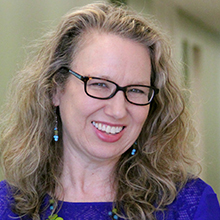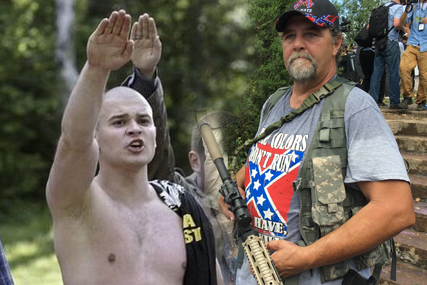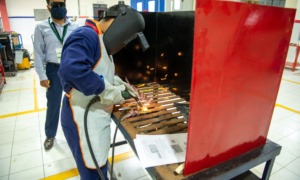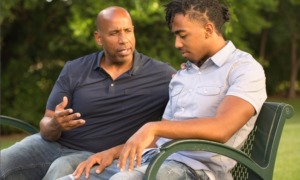In the wake of the deaths in Charlottesville, Virginia, and hate group rallies in other cities, Youth Today reporter Stell Simonton discussed what youth professionals need to know about extremist recruiting with Nancy L. Deutsch, professor at the University of Virginia Curry School of Education. Deutsch is director of Youth-Nex | The U.Va. Center to Promote Effective Youth Development, and has done work in adolescent identity and in creating settings to effectively support youth.
The conversation
Stell Simonton: What do young people who might be attracted to a neo-Nazi or white supremacist group need to hear or experience that could make a difference in their thinking?
Nancy Deutsch: I think teenagers are like all of us. All humans have a basic need to feel like we belong. We all want to feel a sense of purpose in our lives, and we all want to have opportunities to show that we’re competent. I think teenagers need that also. I think one thing that unfortunately white supremacist groups and other extremist groups offer are, quite frankly, those three things.
- They offer a sense of belonging, in this case to a particular racial-ethnic identity and ideology.
- They can offer a sense of purpose.
- And in some cases, depending on what they’re asking youth to do, they can offer a chance to demonstrate competence by engaging in action [although] not in ways that we as a society would consider positive …
I think that, unfortunately, those messages are strong.
White supremacist groups in particular focus on demonizing an “other.” They focus on a shared identity that is being threatened. We know from psychology that there are “in-groups” and “out-groups,” and feeling perceived threats from an out-group creates stronger attachment to an in-group. White supremacist groups … really capitalize on that to create a shared sense of identity that they are trying to suggest is under threat.
Simonton: What do you see as the role of after-school programs? Are they positioned in some way to address this?

Nancy Deutsch
Deutsch: I think after-school programs are uniquely positioned to address this. There was research from the 1990s on urban gangs, and one of the things the research demonstrated was that gangs were actually meeting some of the needs that I just talked about. They gave youth a sense of belonging, a sense of purpose and opportunities to demonstrate competence.
But, in reality, after-school programs are very well situated to meet those same needs and obviously in much more positive ways.
Because after-school programs don’t have the curricular demands of schools, they are able to provide youth with opportunity to explore different interests and to really find an interest they are passionate about and that they can therefore feel a sense of purpose in and demonstrate competence in.
That’s something I think is much harder for schools to do these days because of the curricular demands of standardized testing … So for a youth who doesn’t feel a particularly strong attachment to academics or a particular subject area, after-school can provide an opportunity to try out a lot of meaningful activities. Even identities. Adolescents are in a stage where they are really looking for a sense of self and trying to stake a claim about who they are in this world. After-school programs can help them do that by letting them try out activities and then commit to ones that feel really meaningful to them.
What can after-school programs do?
Simonton: In your research, have you found specific types of programming in after-school that are particularly effective in meeting those three needs that you described?
Deutsch: I think lots of different programs can be effective in that. I have done a fair amount of work in what can be called comprehensive after-school centers — programs like Boys & Girls Clubs where they offer many different activities under one roof. Those kinds of programs can have serious strengths because youth can explore and try out different things instead of committing to being just on the football team or just in the theater program …
Comprehensive centers offer youth an opportunity to form natural mentoring relationships or supportive relationships with multiple adults, which can be a real strength.
Organizations like that can also offer youth a strong sense of identity. … What I’ve seen in some Boys & Girls Clubs, for example, [is] kids would monitor each other’s adherence to the rules based on a shared sense of identity. So for example, if one kid came into the club wearing a hat, you’d see another kid say: “Hey, you’ve got to take your hat off in the club. Don’t do that here. We don’t wear hats in the club.”
So [the programs] gave kids a shared sense of belonging.
I’ve also seen that in leadership programs … programs in which kids may be doing service to the community or be in a group mentoring program. A program I work with, the Young Women Leaders Program, is focused particularly on girls’ leadership. The girls talk about themselves as having a commitment to being a leader because they are associated with this program. There is a responsibility and a role that goes with identification with that program.
So I think that that kind of shared identity can come from multiple different programs, and it has something to do with the kids taking up the purpose of the program as part of their own commitment and part of their own identity.
Simonton: For me that also raises the question of mentoring, one-on-one mentoring. Have you found that to be effective as much as comprehensive programs and leadership programs?
Deutsch: Yes, absolutely. It’s not only comprehensive programs and leadership programs that do this. I think kids can develop very strong sense of identity around various arts [for example if] they are part of a theater troupe or part of an activism group or a service group. I think there’s lots of activity-based organizations for that shared sense of identity. It’s about the youth connection to the people and the activities …
To return to your question about mentoring, there are two competing phrases about adults in the lives of youth. There’s one that comes from the mentoring world about how one adult can make a huge difference. And then, of course, there’s the saying “It takes a village.” I don’t think it’s either/or. Both are true.
Adults, as both formal and informal mentors, play a tremendous role in giving youth social support and serving as role models during adolescence. I think that mentoring programs may not offer as much of a shared identity because it’s not multiple youth, right — except in the case of group mentoring programs …
But I think in one-on-one mentoring programs certainly … the adult can serve as a role model … and model particularly positive identities.
Good mentors also, I think, do help youth develop and feel a sense of competence and purpose. They can really help youth with that. There’s been some new research [including work from the Connecting Adolescents’ Beliefs and Behaviors Study and work by Belle Liang] suggesting that adults do play an important role in that. And also there’s work on critical mentoring [“Critical Mentoring: A Practical Guide” by Torie Weiston-Serdan] about how youth from marginalized backgrounds can really … benefit by explicitly engaging around acknowledging discrimination and racism in our country and [thinking about] social change, not just individual change. So I think there is mounting evidence that mentoring can address many of these same needs and issues.
How to mentor kids at risk of being recruited
Simonton: This raises a question for me. If that kind of mentoring — critical mentoring — is useful, and if one of the tools is to acknowledge the young person’s experience, such as discrimination, in what way might that be used with kids who have the potential for becoming bigoted or being involved in hate groups?
Deutsch: That’s a great question. I think mentoring could obviously be used somewhat nefariously because I think that’s what extremist groups are doing. Think about the ways extremist groups use the internet to target kids who may be feeling marginalized …
I think the way to break that and intervene [is found in] work being done right now around white privilege and whiteness. [It helps] white youth understand the ways in which social structure and systems perpetuate racism and discrimination and inequities. …
Critical mentoring has tended to focus on nonwhite youth from backgrounds that are historically marginalized. But if you think about it as a tool that can be used with white youth … to actually help dismantle racism … I think that we could really take a lesson and apply that … with white youth who might be vulnerable by having mentors who are able to have those conversations.
Simonton: Some of the youth who might be targets of recruitment by white supremacist groups may have a sense of grievance and feel in some way that they have been imposed upon. Would you expect mentors to address that in any particular way? Would they have to have a sort of cultural competence?
Deutsch: Absolutely. White mentors need to be willing to have those conversations with white youth because they need to be able to say: “We have a shared racial identity and I’m going to talk to you about these grievances that you’re reporting and let’s really unpack that. And let’s look at the history, let’s look at the history of our country.”
Many young people — and many adults — don’t understand the history of [discrimination, but conversations] can break down some of those arguments for grievance. …
Some of the same issues around sense of purpose may be true in a majority-white town where jobs have left. That sense of purpose may be just as important as what we thought about in research from urban gangs in the 1990s — which were often in predominantly black and Latino neighborhoods.
It’s that same idea of there not being opportunities to move into adulthood in meaningful ways because of loss of jobs. That is happening in lots of communities right now across races. Those issues of needing a sense of purpose and a way to show competence are important across all of those settings …
This is a challenging time for all of us … My big hope is that this horrific event [in Charlottesville] gets used as an opportunity to do some work around issues of equity and social justice and race in our county.
































